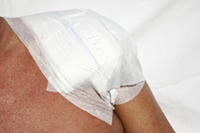LAWSUITS NEWS & LEGAL INFORMATION
Defective Pain Pump Shoulder Injury
Read our Pain Pump FAQ
Patients who have been given shoulder pain pumps after arthroscopic surgery are now questioning whether those pumps should have been used at all. The pumps have been linked to a debilitating condition called postarthroscopic glenohumeral chondrolysis (PAGCL), which can be far worse than the patient's initial condition--that surgery was supposed to treat—and leave the patient with destroyed cartilage.
If you reside in Canada, please [click here] for the Canadian complaint form.
Last updated on
FREE PAIN PUMP LAWSUIT EVALUATION
Send your Pain Pump claim to a lawyer who will review your claim at NO COST or obligation.
GET LEGAL HELP NOW
GET LEGAL HELP NOW
Shoulder Pain Pumps and PAGCL
Shoulder surgery can be painful and pain management is usually required post-surgery. Oral painkillers are often prescribed but to better manage post-surgical pain of arthroscopic shoulder surgery, a disposable small and flexible plastic tube, called an intra-articular pain pump catheter, is surgically implanted in the shoulder joint and left for a few days after surgery to deliver pain medication to that area.
The pump delivers relief but evidence has revealed that it cause severe and irreparable damage. The shoulder pain pump has been associated with Postarthroscopic glenohumeral chondrolysis or PAGCL, an extremely painful condition that can cause life-long disability. PAGCL is one of the most common complications following shoulder surgeries but physicians were unable to determine a cause until a study was published in 2006.
 The study, conducted by the American Academy of Orthopedic Surgeons, reported that the use of shoulder pain pumps may be associated with PAGCL. Medical charts of 152 patients who had undergone arthroscopic shoulder surgeries were studied. Twelve of the patients developed PAGCL, and all of them had received pain pumps during their surgeries. The use of the intra-articular pain pump was the only factor that the PAGCL patients had in common.
The study, conducted by the American Academy of Orthopedic Surgeons, reported that the use of shoulder pain pumps may be associated with PAGCL. Medical charts of 152 patients who had undergone arthroscopic shoulder surgeries were studied. Twelve of the patients developed PAGCL, and all of them had received pain pumps during their surgeries. The use of the intra-articular pain pump was the only factor that the PAGCL patients had in common.
PAGCL is a progressive loss of cartilage of the glenohumeral joint--the joint that joins the arm and shoulder. The head of the arm bone, which connects to the joint, is covered in articular cartilage, which allows the shoulder joint to move smoothly. If this cartilage is damaged or destroyed the shoulder cannot move easily. It will cause significant pain and reduced range of motion.
Shoulder pain pumps did not cause any adverse side effects when the tip of the catheter insert stopped at soft tissue. But pain pump manufacturers allegedly wanted to expand the use—and thus, their market for the units by introducing pain medication directly to the shoulder joint.
According to sources, the manufacturer sought approval from the FDA for expanded use on numerous occasions, asking the FDA to approve the device for inter-articular placement. This additional use was turned down by the FDA but the manufacturer assured the medical community that shoulder pain pumps were safe to use for placement in the joint space.
PAGCL Symptoms
More than 30 lawsuits have been filed nationwide against the manufacturers of shoulder pain pumps, alleging that the devices caused the development of a painful and debilitating condition where the cartilage in the shoulder is destroyed.
In May, 2008 several attorneys filed a petition to consolidate all federal lawsuits filed on behalf of individuals who developed shoulder chondrolysis after using a pain pump following arthroscopic shoulder surgery. But in August, 2009 the United States Judicial Panel on MDL denied the petition. The panel determined that a MDL was not appropriate in shoulder pain pump litigation, mainly because an indeterminate number of different pain pumps made by different manufacturers are at issue, and consolidation would not serve the convenience of the parties and witnesses or further the interests of judicial economy.
About 28 different corporations and medical providers filed in federal court are named as defendants in the various shoulder pain pump lawsuits, including Stryker Corp., I-Flow Corp., Smith & Nephew, Inc., DePuy, Inc., DJO, Inc., Breg, Inc. and AstraZeneca PLC. All of the defendants opposed the consolidation.
What Can You Do?
PAGCL is usually diagnosed with an x-ray showing the narrowing of the shoulder joint space. Treatment for this condition is further surgery; however, many patients never regain full use of their shoulder joint.
If you'Âve had arthroscopic shoulder surgery and were given a shoulder pain pump, and are experiencing any of the above symptoms you should contact your doctor immediately. And you may want to seek legal help.
The pump delivers relief but evidence has revealed that it cause severe and irreparable damage. The shoulder pain pump has been associated with Postarthroscopic glenohumeral chondrolysis or PAGCL, an extremely painful condition that can cause life-long disability. PAGCL is one of the most common complications following shoulder surgeries but physicians were unable to determine a cause until a study was published in 2006.
 The study, conducted by the American Academy of Orthopedic Surgeons, reported that the use of shoulder pain pumps may be associated with PAGCL. Medical charts of 152 patients who had undergone arthroscopic shoulder surgeries were studied. Twelve of the patients developed PAGCL, and all of them had received pain pumps during their surgeries. The use of the intra-articular pain pump was the only factor that the PAGCL patients had in common.
The study, conducted by the American Academy of Orthopedic Surgeons, reported that the use of shoulder pain pumps may be associated with PAGCL. Medical charts of 152 patients who had undergone arthroscopic shoulder surgeries were studied. Twelve of the patients developed PAGCL, and all of them had received pain pumps during their surgeries. The use of the intra-articular pain pump was the only factor that the PAGCL patients had in common.
PAGCL is a progressive loss of cartilage of the glenohumeral joint--the joint that joins the arm and shoulder. The head of the arm bone, which connects to the joint, is covered in articular cartilage, which allows the shoulder joint to move smoothly. If this cartilage is damaged or destroyed the shoulder cannot move easily. It will cause significant pain and reduced range of motion.
Shoulder pain pumps did not cause any adverse side effects when the tip of the catheter insert stopped at soft tissue. But pain pump manufacturers allegedly wanted to expand the use—and thus, their market for the units by introducing pain medication directly to the shoulder joint.
According to sources, the manufacturer sought approval from the FDA for expanded use on numerous occasions, asking the FDA to approve the device for inter-articular placement. This additional use was turned down by the FDA but the manufacturer assured the medical community that shoulder pain pumps were safe to use for placement in the joint space.
PAGCL Symptoms
- Increased pain in the shoulder at rest and with motion
- Increased stiffness in the shoulder
- Clicking, popping or grinding (Crepitus) in the shoulder
- Decrease in range of motion in the shoulder
- Loss of strength
- Joint space narrowing as shown on an x-ray
More than 30 lawsuits have been filed nationwide against the manufacturers of shoulder pain pumps, alleging that the devices caused the development of a painful and debilitating condition where the cartilage in the shoulder is destroyed.
In May, 2008 several attorneys filed a petition to consolidate all federal lawsuits filed on behalf of individuals who developed shoulder chondrolysis after using a pain pump following arthroscopic shoulder surgery. But in August, 2009 the United States Judicial Panel on MDL denied the petition. The panel determined that a MDL was not appropriate in shoulder pain pump litigation, mainly because an indeterminate number of different pain pumps made by different manufacturers are at issue, and consolidation would not serve the convenience of the parties and witnesses or further the interests of judicial economy.
About 28 different corporations and medical providers filed in federal court are named as defendants in the various shoulder pain pump lawsuits, including Stryker Corp., I-Flow Corp., Smith & Nephew, Inc., DePuy, Inc., DJO, Inc., Breg, Inc. and AstraZeneca PLC. All of the defendants opposed the consolidation.
What Can You Do?
PAGCL is usually diagnosed with an x-ray showing the narrowing of the shoulder joint space. Treatment for this condition is further surgery; however, many patients never regain full use of their shoulder joint.
If you'Âve had arthroscopic shoulder surgery and were given a shoulder pain pump, and are experiencing any of the above symptoms you should contact your doctor immediately. And you may want to seek legal help.
Defective Shoulder Pain Pump Legal Help
If you or a loved one has suffered damages due to a defective shoulder pain pump, please click the link below to send your complaint to a lawyer to evaluate your claim at no cost or obligation.If you reside in Canada, please [click here] for the Canadian complaint form.
Last updated on
PAIN PUMP LEGAL ARTICLES AND INTERVIEWS
Feds Turn Up Noses to $17 Million Shoulder Pain Pump Lawsuit

Doctors Advise Patients to File Shoulder Pain Pump Lawsuits
.jpg)
Heating Pad Better than Shoulder Pain Pump


January 27, 2013
A $17 million shoulder pain pump lawsuit filed in January, 2011 under the False Claims Act was unsealed just before Christmas of last year after the federal government decided not to intervene. The lawsuit alleges that various manufacturers of shoulder pain pumps advocated uses for the device that were not approved by the US Food and Drug Administration (FDA). READ MORE
Doctors Advise Patients to File Shoulder Pain Pump Lawsuits
.jpg)
December 27, 2012
Jordana’s latest orthopedic surgeon advised her to go online, find a shoulder pain pump attorney and file a shoulder pain pump lawsuit. “He told me that the cartilage in my shoulder has worn away and that is why he doesn’t use these pain pumps anymore,” says Jordana. READ MORE
Heating Pad Better than Shoulder Pain Pump

October 10, 2012
Basil rues the day he agreed to have a shoulder pain pump inserted after his second shoulder surgery. And he regrets having the next two pain pumps. READ MORE
READ MORE Defective Products Settlements and Legal News
READ MORE Drugs/Medical Settlements and Legal News
READ MORE Drugs/Medical Settlements and Legal News

READER COMMENTS
Hannah
on
Kristen
on
California
on
California
on
British Columbia
on
In June 08 I had a rotator cuff repair on right shoulder.
In April 09 I had a Bicep Repair on right shoulder with pain pump.
My right shoulder is very, very painful with limited movement and stiffness, it looks like another surgery will be in the works.
Alaska
on
Arizona
on
Georgia
on
Florida
on
North Carolina
on